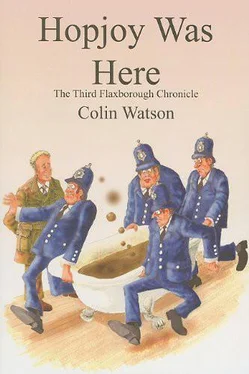Hopjoy Was Here
Colin Watson
Chapter One
Never before had the inbabitants of Beatrice Avenue seen a bath carefully manoeuvred through one of their front doors, carried down the path by four policemen, and hoisted into a black van. Everybody watched, of course; whether from the vantage point of a bedroom window or delicately through parlour lace or with bold and naked curiosity at the gate. A postman was frozen in sidelong contemplation on a doorstep five houses farther up. A butcher’s boy and two window cleaners huddled in temporary comradeship with a rate collector on the opposite kerb and stretched involuntarily in time with the policemen’s efforts as the bath was lifted and eased along the floor of the van. Twenty or more children, mysteriously summoned by their extra-sensory perception of odd goings-on, formed the nearest and most importunate section of the audience. They savoured the affair with the discrimination of experts, comparing it with the fire in Harley Close two months back, last summer’s impaling of the greengrocer’s horse, and the wonderful, blood-chilling entertainment in Gordon Road the previous Easter when Mrs Jackson had gone bonkers and thrown all the portable contents of the house, including a gramophone and two chamber pots, down upon some men from the council.
The children jostled for glimpses of the bath, gleaming dimly in the depths of the van. “Mister, wotcher been and took it out for?” “Where yer goin’ with it, mister?” And a rash jest, thrown out by a bobbing, streaky-faced girl of twelve: “They’re going to wash their socks! All the coppers is going to wash their socks!” There was a quick squawking cadenza of laughter. A little hysteria was mixed in it: not all the children were insensitive to the sinister obscenity of the bath’s removal.
Two of the policemen, ponderous and flushed, shut the van’s rear doors. Not looking at the children, they paced slowly to the cab and climbed in. As the van drew away, the third policeman made awkward shooing gestures and announced: “Nothing more to see. Run along home, all of you.” Then he turned with his companion and they went up the little path and into the house, closing the door behind them.
The watchers in Beatrice Avenue remained alert for varying periods but by the end of half an hour only two or three of the chronically curious had not tired of peering at the unrewarding facade of number fourteen and at the black police car that still stood a few yards from its front gate.
Luckier were the occupants of the house in Pawson’s Lane that backed on to fourteen Beatrice Avenue. They, a mother and her middle-aged daughter, had a view denied to those who lingered on doorsteps or behind parlour windows.
Overlooking the passageway at the side of number fourteen—a space hidden from the front street by a tall, solid gate—they were able to see the intriguing activities of two men in plain clothes.
This pair worked with a sort of fastidious dedication. They were unhurried and seemed to be taking good care of their suits as they knelt on sheets of newspaper and passed implements to each other like brother surgeons.
Together they levered up the grilled cover plate of a drain, examined it and set it aside. Then, using a long-handled dipper, one began to ladle liquid from the drain and pour it gently through a funnel held by the other into the first of two big Winchesters. At the end of about twenty minutes both bottles were full. The man who had been holding the funnel stoppered them and moved them out of the way.
He next selected and handed to his companion what appeared to be a tea-strainer on the end of a rod and prepared a wide-mouthed glass jar to receive whatever might be dredged.
The strainer was lowered into the drain. Its manipulator held it lightly and probed for a few seconds like a well-bred guest trying to determine whether his hostess had sugared his tea. When the strainer was withdrawn its mesh held a black, dripping slime-bound miscellany. This was allowed to drain awhile, then turned and tapped out into the jar.
A second and a third exploration produced further gobbets of solid but as yet unidentifiable matter. Patiently as anglers, the kneeling pair went on with their task until the strainer repeatedly emerged empty. Then one replaced the drain grill, the other screwed down the lid of the jar, and both stood, stretching gratefully and plucking straight their trouser creases.
The old woman, perched on the side of her bed, her chin resting on arms folded on the window sill, acknowledged with a grunt the completion of the operation. But she did not take her eyes from the opposite passageway.
Her daughter, a desiccated woman with a cruel, helmet-like perm, and an air of irreparable disappointment, did not move either. She continued to stand stiffly at her mother’s side, holding the curtain like a shield in apprehension of a flight of arrows.
“What have they found, Mirrie?” the old woman whispered.
“I don’t know. Something in the drains. I can’t see any more than you.”
“Do you think Mr Periam knows they’re there? The police, I mean. It is the police, Mirrie. That one in the grey who’s just gone in—I saw him at the station when I went about the purse. It’s funny Mr Periam’s not there, though.”
“He’s still away, I expect.”
“What about the other chap, his friend or lodger or whoever he was?”
“I don’t know about him.”
There was a pause. “It’s funny about all those policemen,” the old woman said. “Policemen don’t clear drains.” She sounded annoyed rather than intrigued.
The daughter said nothing. She moved the curtain a little farther aside and watched a short ladder being placed carefully against the wall by the remaining occupant of the passageway—the one not in grey. He climbed and peered into the cup of the fall pipe. After exploring delicately with one finger and apparently finding nothing of interest, he descended, laid the ladder down beside the dividing fence, and entered the house.
This now contained two uniformed constables, who had put their helmets side by side on a table in the kitchen and were standing, large, uneasy and tousle-browed near the front door; the plain-clothed pair who had been busy outside; a plumber strapping up his bag in the denuded, forlorn-looking bathroom; and two sharply contrasted but seemingly intimate figures who systematically searched and appraised the stuffy, brown, shiny-papered dining-room.
One of these was several inches over six feet tall; he stood loosely, as if good-humouredly apologetic for his bulk, and looked around with his head slightly on one side like a very high class auctioneer deliberately ignoring the bids of merely moneyed men. He had the firm, amused mouth of a good listener. Now and then he ran long fingers through springy, corn-coloured hair.
His companion was shorter by a head, but made of a lot of prime meat. His smooth, glowingly healthy face looked about eleven years old. It had set like that, in point of fact, twenty-three years before, when he really was eleven.
The man with yellow hair opened the doors of a mahogany sideboard and knelt to look inside. On one shelf there were neatly stacked piles of patterned china and some folded table linen. The second shelf contained some bags of sugar, cruet and butter dish, three opened packets of various breakfast cereals, jars of jam and marmalade, a supply of canned food and a basin with about an inch of a white, congealed substance in the bottom. It had set around the bristles of a broad paint brush.
“Excuse me...”
A third man had silently entered the room. He looked inquiringly at each of the searchers. “Detective Inspector Purbright?”
The kneeling man rose. “I’m Purbright.”
Читать дальше

![Fredrik Backman - Britt-Marie Was Here [Britt-Marie var här]](/books/61260/fredrik-backman-britt-marie-was-here-britt-thumb.webp)










